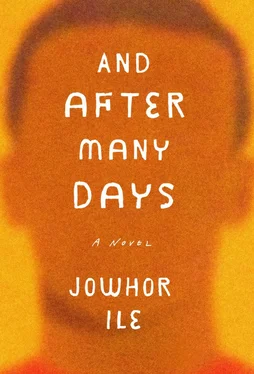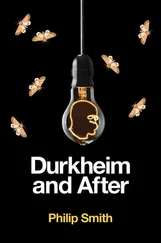When their parents talked about their time in Lagos, their voices softened and they spoke as if it were another life altogether, more exciting than the one they had now. Paul, Bibi, and Ajie dubbed the period “Those Days in Lagos,” because Ma always began stories with “Those days in Lagos…” Sometimes it happened when she came across a dress in her wardrobe or something in her trunk box — a purse, coral beads — that reminded her of the time. She would hold the item a little away from her face to get a better look. “Twenty-five Enitan, Ikeja, Lagos. Ah-ah,” she would hiccup, as if there were someone there to disbelieve her. And without looking toward Bendic, she would say, “We lived life then, Ben.” It was something like pride mixed with regret. The war had broken out after the eastern region announced secession from the rest of the country, and they had rushed back home to be close to family. Sometimes a prominent person’s name would come up on the national news, and Ma would say they had known the person back then in Lagos. Was he not such-and-such person’s husband? Or did she not work in the same office with this-and-that person? “We lost touch with so many good friends.”
That same tone was in her voice one day at the market when she surprised the butcher, interrupting him with her own thundery Yoruba, to the man’s surprise. The butcher had said to his assistant in Yoruba to give Ma a tough bargain, as she looked like she had a lot of money in her bag.
“Ole Olodo,” Ma fired out. “Stupid thief.”
The man covered his mouth with his hands in mock wonder, bleated out a nervous laugh, and cowered. “My sister,” he begged in English, “it’s not like that.”
“How is it, then?” Ma shot back, giving him a mean look. Rather than condemn the butcher for trying to cheat her, she said to him instead in pidgin, “Nearly ten years I live for Lagos,” as if the man’s principal offense were his lack of discernment. She got a discount, and the man, with quick slashes of his knife, chopped up some more of the red meat and threw it all into the black cellophane bag for goodwill.
“You are my customer now-o, madam,” he said, laughing.
“Na so.” Ma was either unimpressed or feigning it. She gestured to Paul to pick up the bag, and they made their way toward the hub of women at the end of the market who operated large grinding machines where, at a small charge, you could get your tomatoes blended and the puree packaged securely in a cellophane bag.
Bibi pointed out a woman in the fish section and whispered to Ajie that the woman was an actress in a television drama. “Nchelem. Don’t you know her? From Willi-Willi…Hot Cash .”
“It’s not her,” Ajie said, and looked in another direction to insist on his point.
“Stay out of the way,” Ma said to the two of them. “Come this way.” She pulled Ajie close as a shirtless, sweaty man pushed past them with a wheelbarrow loaded with sacks of onions. Paul handed the bag of fresh tomatoes to the woman behind the grinder, who started the noisy engine and then began yelling prices at Ma.
When they got back to the car, Ma said she had taught the butcher a lesson. She seemed pleased with her performance. Paul said it didn’t really matter; the man would cheat someone else who didn’t understand the language.
“Egg zatly,” Bibi said. Ajie sniffed, because Bibi always wanted to have some input in every discussion.
“That’s his business if he doesn’t want to learn,” Ma insisted, bent on making a lesson for her children, “but at least this should show you can’t always judge people at face value.”
“Face value,” Paul echoed, and Ajie wondered about Face Value as the car made its slow, bumpy exit out of Oroworukwo onto Aba Road, and as it climbed the low hillock at St. John’s and descended toward the traffic lights at Garrison, where, to their right, scaffolding had gone up outside the Hotel Chez Therese, but there were no workmen about. On the island between the express lanes, in the traffic controller’s booth, a madman in long brown dreads stood, frantically motioning to cars, and his enormous scrotum dangled and jiggled from the effort. The lights turned green and their car sped toward home, while Ajie still mulled over Face Value and the madman’s morbidly enormous balls and the butcher’s knife. Ma honked as they approached 11 Yakubu. Paul got out of the car to help Ismaila open the gate.
—
Paul was born in the year Bendic became a Christian; that was why they gave him the name. “After the apostle formerly known as Saul,” Bibi would always say with glee, marveling at her own wit. It might be more accurate to refer to this period as the year Bendic renewed his Christian commitments. His father’s being a churchman would have made it unlikely for Bendic to have escaped a Christian upbringing altogether.
Bendic was the sixth of eight boys and the only one to live past the age of nineteen. The others drowned, fell off a tree in those early days of timber trading, got bitten by a snake. One strong-headed one went to the farm on a sacred day of the bush and saw Erusumini the beautiful, the serpent goddess, glowing in the lonely afternoon light. He ran home and collapsed, hot with fever, then convulsed and died that same night, frothing at the mouth. The second set of twins weren’t only drowned at birth; the man whose family duty it was to carry out the task — having great pity on the mother, who had now suffered the abomination twice — pierced the eyes of the boys as their lungs filled with water. He would blind them from seeing their way back to this same family to cause sorrow.
Everything that came to Bendic’s parents through birth seemed shy of adulthood except Bendic. And by the time Bendic had his own children, he was old enough to be a grandfather.
In the years that followed Paul’s birth, the years before Bibi and Ajie were born, Bendic’s brief spiritual revival had mellowed, so he gave the two of them Ogba names that had nothing to do with God. He didn’t bother with a Christian or English middle name, as was the fashion then among the educated classes.
On a cool March morning in 1978, Bendic got baptized at Idu waterside. His father had died a few weeks earlier, and Ma had just found out she was pregnant for the first time.
“The world is such a funny place,” Ma would say later to her children, “my mother-in-law, your grandmother, would have been the happiest woman in the world to hear the news. But she was in her grave before her time. When I first realized I was pregnant and thought of how happy she would have been, it made me sad to know she had missed all of it.”
The children knew little about Bendic’s mother except that she died of heartbreak during the war. Bendic hardly ever spoke about it. Ma one day told them the story. She said it was unfair for them to ask their father.
—
An Ogibah man had gone to report to the Biafran authorities that Bendic was a saboteur, that he was a supporter of and a spy for the Nigeria side. It was nearly a year since the war began. There were rumors everywhere, about how Oguta had fallen, how Port Harcourt was soon to be captured. Prominent members of non-Igbo minorities were being seized and thrown into detention on suspicion of sabotage. Soldiers came one afternoon and arrested Bendic. They said they were taking him away for questioning, nothing to fear, if he was innocent he would be returned. Two days after they took him, Ma borrowed a bicycle and set out to look for him. Another Ogibah man, whom she said she would never forget, rode with her on the journey. His name was Ireju. They got to Ahoada, and the people there said the soldiers had carried the detainees to Elele. They got to Elele and were told they had moved them that afternoon to Isiokpo. At Isiokpo, the soldiers there said they had been taken to Umuahia. She gave them Bendic’s full name, she described him, she told them he was her husband, that his parents were very old. Then she told them he was not a saboteur, that this was just the handiwork of enemies in the village. That day, people in Isiokpo began to pack and run away, since there was news that Nigerian soldiers were approaching and shelling villages as they went.
Читать дальше












